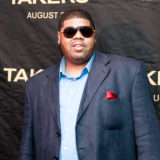
Carl E. Thompson, better known as Chucky, a producer who’d been making hits with artists ranging from Notorious B.I.G. to Mary J. Blige since the mid-’90s, died from COVID-19 complications on Monday at the age of 53. One of Thompson’s friends and proteges, longtime Jay-Z engineer Young Guru, broke the news on Monday that Thompson had died at the age of 53.
“You were the kindest person the world has ever seen. You were the most gifted musician I have ever been around,” Guru wrote on Instagram.
Thompson joins a long list of notable musicians who’ve died after contracting the COVID-19 virus in 2020 and 2021, including John Prine, Charley Pride, Fred the Godson, Adam Schlesinger, Joe Diffie, and Hal Willner.
In many ways, Thompson was a producer’s producer. He was the type of musician who was known best among other artists, and obsessive fans who read liner notes. When Sean “Puff Daddy” Combs became one of hip-hop’s most famous artist/producers in the 1990s, Thompson was one of the core members of his production team, The Hitmen, that helped Bad Boy Records ascend to industry dominance.
Part of the Hitmen’s legacy was based on Thompson’s gift for chopping up and recontextualizing samples of famous songs that the Bad Boy brand was built on. Perhaps his most enduring production is the Notorious B.I.G.’s 1994 hit “Big Poppa,” which put a hip hop spin on a luxurious groove from The Isley Brothers’ ‘80s quiet storm staple “Between the Sheets.” But as a skilled guitarist, bassist, and keyboardist, Thompson could build a song from the ground up and could put together the kind of lush original R&B tracks that Bad Boy rappers were sampling, like “You Used To Love Me,” the hit debut single by Biggie’s wife Faith Evans.
A Washington, D.C. native, Thompson cut his teeth playing Go-Go, a regionally popular style of live funk with slow, loping grooves that has packed clubs in the nation’s capital since the ‘70s. Thompson played with Go-Go bands like Petworth and Ayre Rayde, as well as the genre’s Godfather, Chuck Brown. In the 2000s, Thompson often returned to his roots, producing records for Chuck Brown and Rare Essence that fused classic Go-Go sounds with the polished studio sensibility of his work with hip-hop stars.
After Chucky Thompson befriended fellow Howard University alum Combs, Thompson became a go-to producer for artists who merged rap and R&B into a fusion often referred to as “hip hop soul.”
In 1994, Thompson became the musical driving force for My Life, Mary J. Blige’s most personal and most influential album, recorded amidst her struggles with addiction and abuse. Thompson had an overdue moment in the spotlight in Mary J. Blige’s My Life, a documentary about the album by director Vanessa Roth that was released on Amazon Prime in June. “I just wanted to make sure she had that royal but yet still grounded, hood feeling about the songs that I was delivering to her,” Thompson said in the film, explaining how ‘70s Blaxploitation soundtracks inspired the soulfully streetwise ethos of the music. “You was dead on with the dark that I was living,” Blige told Thompson in the same scene. “I was all fucked up, and I needed somebody to understand, through music, and you understood,” Blige tells him.
Thompson worked on a wide-ranging array of hits, including the funky, reggae-inflected “Bonnie & Shyne” by Shyne and Barrington Levy, and the smooth West Coast groove of Ice Cube’s “Until We Rich.” He produced “Think of You,” the biggest hit from the debut album that future superstar Usher released at the age of 15. He contributed tracks platinum-selling albums by TLC, New Edition, and Total, and produced Grammy-nominated records for Raheem DeVaughn and Emily King.
However, Thompson’s finest moment is “One Mic,” the 2002 single from Nas’s album Stillmatic. With soft/loud dynamics rarely heard in hip-hop, Thompson opens the song with a spare, moody groove, Nas rapping just above a whisper. But as Nas’s voice rises in intensity over the course of each verse, Thompson’s music mirrors him with police car sirens and crashing drums borrowed from a Barry White breakbeat, until the fever breaks and the original placid groove returns and Nas declares “all I need is one mic.”
On Monday afternoon, a couple of hours after the news of Thompson’s death broke, I took my kids swimming. The lifeguard and a couple of other young guys were listening to music at the pool, mostly recent music by rappers like Pop Smoke. But they played one song that was released before they were born, rapping along to every word, and it was “Big Poppa.” I don’t know if those guys had an idea who Chucky Thompson was, that he grew up minutes away from our Maryland suburb, or that he had just passed away. But they gave me some comfort that Thompson’s work will live on.



Leave a comment